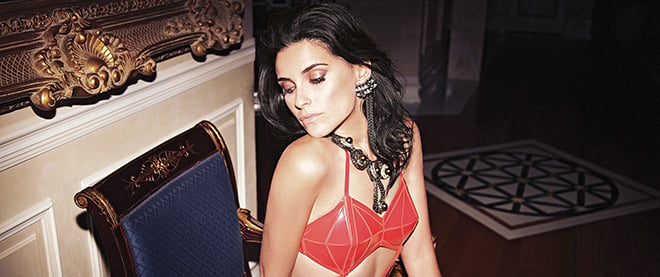Nelly Furtado flips the switch back on
Six years after she ruled the world with Loose, the pop star learns to say yes again
Richard Bernardin/Universal Music Group
Share

Impeccably coiffed and styled, a silk scarf wreathed around the collar of her jean jacket, Nelly Furtado leans forward on a couch in a Toronto hotel suite. “I’m still a bit of a s–t disturber.” She lets out a goofy laugh. “I’m still a little punk ass somewhere inside my soul. And I think I get off on confusing people.”
The 33-year-old pop star is referring, specifically, to her unpredictable new album, The Spirit Indestructible; some of its songs look back to her youth in Victoria, B.C., as a teenager with “a big chip on her shoulder [who] knows that at any party she can grab the microphone and everyone will listen to her sing.” But she could just as well be talking about her career. It’s indeed confusing that she’s taken six full years to make an English language follow-up to Loose, which sold more than 10 million copies worldwide.
What does it take for a star of her stature to stall the momentum of her success? “It took strength to say no to my manager,” she says. “It took a lot of repeated ‘no, no, no’s’ for people to understand that I wasn’t recording another [English] album anytime soon . . . What are they going to do—put a ball and chain around a microphone in the studio?”
In 2007 she started crying on stage during a concert; she describes this as a breakdown and a symptom of burnout. The song High Life on The Spirit Indestructible is about “when you get into this business so young.” Furtado was 21 when she released her chirpy debut Whoa, Nelly!, with its ubiquitous hit, I’m Like a Bird. “It’s like the kid that went to med school because his parents wanted him to,” she says. “You see success as a mathematical equation, but it’s the opposite.”
In the years after Loose, she raised her daughter, Nevis (now 9), developed her own record label, Nelstar, and recorded and promoted the 2009 Spanish language album Mi Plan, which was a hit in what the record industry moguls would consider a niche market. Where she saw Mi Plan as an opportunity for artistic “reprogramming,” she calls The Spirit Indestructible a “palate cleanse.” Certainly, she took her time with the album, working on 60 songs stretching back to sessions in 2008 with Loose producer Timbaland, from which “nothing stuck.” Last year, she found instant musical chemistry with producer Rodney “Darkchild” Jerkins (Beyoncé, Mariah Carey). “When you’ve worked with everybody, you feel like there’s nothing else left to really work on or accomplish, and Nelly comes along and changes that whole mindset,” he says on the phone from his studio in Los Angeles. “Most of the stuff on radio today is pretty much close in tempo, in a certain style, and we veered away from that.”
Jerkins pushed Furtado to use harder beats and emphasize the stylized, repetitive phrasing that was an early element of her singing and has influenced the likes of Rihanna and M.I.A. In turn, she expanded his stylistic range: the songs they wrote mash together tribal, hip hop, drum ’n’ bass, doo-wop and Portuguese folk elements, among others, often switching gears without warning. Furtado says she aims to make music that “moves your cells around” and creates “some kind of visceral reaction.”
Some of her songs also touch on serious themes. Having played the sex kitten role with great success on Loose, she’s less focused on the pop charts and more interested in the world. Jerkins is reminded of the time he spent producing Michael Jackson, “one of the rare artists that didn’t mind talking about world issues and healing . . . I remember, when I was playing these really pretty chords and Nelly started singing about miracles, going, ‘Wow! I haven’t heard anything like this since Michael did it.’ ”
Furtado’s take is more self-effacing, with a hint of steel. “I’m not afraid to risk being corny or self-righteous,” she says. The album closes with the fist-pumping rock anthem Believers (Arab Spring), inspired by the Libyan revolution. Last year she donated $1 million to Free the Children, the same amount she was paid in 2007 for performing for the Gadhafi clan. “I’m allowed to maybe have an opinion on things sometimes. I think it’s missing in popular music.” So no one is addressing these issues? “No, not really. So why not? At least you’ll be unique.”